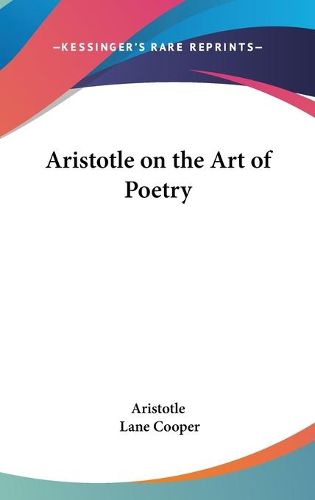Readings Newsletter
Become a Readings Member to make your shopping experience even easier.
Sign in or sign up for free!
You’re not far away from qualifying for FREE standard shipping within Australia
You’ve qualified for FREE standard shipping within Australia
The cart is loading…






Aristotle on the Art of Poetry is a book written by the ancient Greek philosopher Aristotle, which provides an in-depth analysis of the nature and function of poetry. The book is divided into three parts: the first part deals with the nature of poetry, the second part with the different types of poetry, and the third part with the elements of poetry.In the first part, Aristotle defines poetry as an imitation of reality, and discusses the different ways in which poets imitate reality. He also explores the role of emotion in poetry, and argues that poetry is a form of catharsis that allows people to experience and release their emotions.In the second part, Aristotle discusses the different types of poetry, including epic poetry, tragedy, comedy, and lyric poetry. He analyzes the characteristics of each type of poetry and explores the different ways in which they are used to convey meaning.In the third part, Aristotle examines the elements of poetry, including plot, character, thought, diction, melody, and spectacle. He discusses the importance of each element and how they work together to create a successful poem.Overall, Aristotle on the Art of Poetry is a seminal work in the field of literary criticism and has had a profound influence on the study of poetry and drama. It is a must-read for anyone interested in the history of literature and the art of writing.1913. An Amplified Version With Supplementary Illustrations for Students of English. From the Preface: The Poetics as it has come down to us may represent a part of Aristotle???????s notes for a set of lectures, or perhaps for a dialogue; though now and then it seems more like the uneven memoranda of some person who attended the lectures. Contents: Character and Value of the Poetics; Epic Poetry and Tragedy, and Comedy, Considered in General as Forms of Imitative Art; Tragedy Defined. The Principles of Its Construction; Epic Poetry. The Principles of Its Construction; and Problems in Criticism. The Principles of Their Solution.This scarce antiquarian book is a facsimile reprint of the old original and may contain some imperfections such as library marks and notations. Because we believe this work is culturally important, we have made it available as part of our commitment for protecting, preserving, and promoting the world's literature in affordable, high quality, modern editions, that are true to their original work.
$9.00 standard shipping within Australia
FREE standard shipping within Australia for orders over $100.00
Express & International shipping calculated at checkout
Stock availability can be subject to change without notice. We recommend calling the shop or contacting our online team to check availability of low stock items. Please see our Shopping Online page for more details.
Aristotle on the Art of Poetry is a book written by the ancient Greek philosopher Aristotle, which provides an in-depth analysis of the nature and function of poetry. The book is divided into three parts: the first part deals with the nature of poetry, the second part with the different types of poetry, and the third part with the elements of poetry.In the first part, Aristotle defines poetry as an imitation of reality, and discusses the different ways in which poets imitate reality. He also explores the role of emotion in poetry, and argues that poetry is a form of catharsis that allows people to experience and release their emotions.In the second part, Aristotle discusses the different types of poetry, including epic poetry, tragedy, comedy, and lyric poetry. He analyzes the characteristics of each type of poetry and explores the different ways in which they are used to convey meaning.In the third part, Aristotle examines the elements of poetry, including plot, character, thought, diction, melody, and spectacle. He discusses the importance of each element and how they work together to create a successful poem.Overall, Aristotle on the Art of Poetry is a seminal work in the field of literary criticism and has had a profound influence on the study of poetry and drama. It is a must-read for anyone interested in the history of literature and the art of writing.1913. An Amplified Version With Supplementary Illustrations for Students of English. From the Preface: The Poetics as it has come down to us may represent a part of Aristotle???????s notes for a set of lectures, or perhaps for a dialogue; though now and then it seems more like the uneven memoranda of some person who attended the lectures. Contents: Character and Value of the Poetics; Epic Poetry and Tragedy, and Comedy, Considered in General as Forms of Imitative Art; Tragedy Defined. The Principles of Its Construction; Epic Poetry. The Principles of Its Construction; and Problems in Criticism. The Principles of Their Solution.This scarce antiquarian book is a facsimile reprint of the old original and may contain some imperfections such as library marks and notations. Because we believe this work is culturally important, we have made it available as part of our commitment for protecting, preserving, and promoting the world's literature in affordable, high quality, modern editions, that are true to their original work.